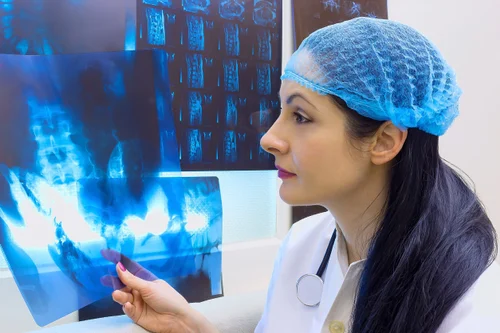Neuro and Spine Care

Neuro and Spine Care at Galaxy Hospital:
Welcome to Galaxy Hospital’s Neuro and Spine Care Center, where we are committed to providing world-class treatment and personalized care for patients with neurological and spinal conditions. Our expert team of neurologists, neurosurgeons, spine specialists, and rehabilitation therapists are dedicated to improving the quality of life for our patients by delivering the most advanced and effective treatments available. Whether you’re experiencing chronic back pain, recovering from a spinal injury, or dealing with a complex neurological condition, our goal is to help you regain your health and live your life to the fullest.
Understanding Neuro and Spine Conditions
The nervous system is a complex network that includes the brain, spinal cord, and nerves. When something goes wrong within this system, it can affect every part of your body. Neuro and spine conditions can range from mild to severe, impacting your ability to move, feel, and function normally. At Galaxy Hospital, we specialize in diagnosing and treating a wide range of neurological and spinal disorders, ensuring that each patient receives the care they need.
Common Conditions We Treat
- Herniated Discs: This occurs when the soft inner material of a spinal disc pushes through a crack in the tougher exterior, often leading to pain, numbness, or weakness in the arms or legs.
- Spinal Stenosis: A narrowing of the spaces within your spine, which can put pressure on the nerves that travel through the spine, leading to pain, tingling, and muscle weakness.
- Sciatica: Caused by irritation of the sciatic nerve, sciatica results in pain that radiates from the lower back through the hips and down each leg.
- Spinal Cord Injuries: Damage to the spinal cord can result in partial or complete loss of motor function and sensation below the site of injury.
- Brain Tumors: Abnormal growths in the brain can affect brain function and are treated through a combination of surgery, radiation, and chemotherapy.
- Epilepsy: A neurological disorder marked by recurrent, unprovoked seizures that require careful management to control.
- Multiple Sclerosis (MS): A chronic illness involving the central nervous system, where the immune system attacks the protective covering of nerves, leading to communication problems between the brain and the rest of the body.
Causes of Neuro and Spine Conditions
Neuro and spine conditions can arise from a variety of factors, including:
- Trauma: Injuries from accidents, falls, or sports can damage the spine or brain, leading to immediate or long-term neurological issues.
- Degenerative Diseases: Conditions like osteoarthritis or degenerative disc disease can cause the spine to deteriorate over time, leading to chronic pain and disability.
- Infections: Certain infections, such as meningitis or encephalitis, can affect the brain and spinal cord, leading to serious neurological conditions.
- Genetics: Some neuro and spine conditions, like Huntington’s disease or certain types of spinal deformities, are inherited.
- Tumors: Both benign and malignant tumors can develop in the brain or spine, leading to a range of symptoms depending on their location and size.
Symptoms to Watch Out For
The symptoms of neuro and spine conditions can vary widely depending on the specific issue. However, some common symptoms include:
- Chronic Pain: Persistent pain in the back, neck, or limbs could indicate a spine condition.
- Numbness or Tingling: These sensations, especially in the arms or legs, can be a sign of nerve damage.
- Weakness: Difficulty lifting objects, walking, or performing other physical activities may suggest a neurological problem.
- Loss of Coordination: Difficulty with balance and coordination can be a symptom of brain or spinal cord issues.
- Headaches: Severe or chronic headaches, particularly those that are worse in the morning or when lying down, could indicate a neurological disorder.
- Seizures: Any unexplained seizure should be evaluated by a specialist.
- Cognitive Changes: Memory loss, confusion, or difficulty concentrating can be signs of a neurological condition.
Treatment Options
At Galaxy Hospital, we believe in a multidisciplinary approach to treating neuro and spine conditions. Our treatments are tailored to each patient’s specific needs, with a focus on improving function and quality of life. Some of the key treatments we offer include:
- Medications: Depending on the condition, medications can help manage symptoms, reduce inflammation, and control seizures or pain.
- Physical Therapy: Rehabilitation is crucial for patients recovering from injuries or surgeries. Our physical therapists work with patients to strengthen muscles, improve mobility, and reduce pain.
- Surgery: In some cases, surgery is necessary to correct structural problems, remove tumors, or relieve pressure on the spinal cord or nerves. Our neurosurgeons use the latest techniques to perform minimally invasive procedures whenever possible.
- Spinal Injections: For certain conditions, such as herniated discs or sciatica, steroid injections can help reduce inflammation and alleviate pain.
- Pain Management: Chronic pain can be debilitating, but our pain management specialists offer a variety of treatments, including nerve blocks, spinal cord stimulation, and other advanced techniques.
- Neurostimulation: For patients with severe nerve pain or dysfunction, neurostimulation devices can be implanted to provide relief by disrupting pain signals to the brain.
- Lifestyle Modifications: Patients are encouraged to make lifestyle changes, such as adopting a healthy diet, exercising regularly, and quitting smoking, to improve their overall health and reduce the risk of complications.

